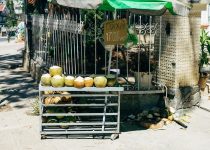How-to Weatherproof Your Outdoor Kitchen Appliances
Want to keep your outdoor kitchen appliances protected from the elements? Learn how to weatherproof them with these simple tips.
- Choose durable materials.
- Install protective covers.
- Seal gaps.
- Elevate appliances to prevent water damage.
Don’t forget to use waterproof electrical outlets and wiring. Regular cleaning and maintenance will ensure their longevity.
Follow these steps and enjoy your outdoor cooking without worrying about the weather!
Table of Contents
Choose Weather-Resistant Materials
Choose materials that are weather-resistant for your outdoor kitchen appliances. When selecting materials for your outdoor kitchen, it’s crucial to consider their ability to withstand various weather conditions. Opt for materials like stainless steel, which is known for its durability and resistance to corrosion. Stainless steel isn’t only sturdy but also easy to clean, making it ideal for outdoor use.
Another excellent option is teak wood, which is naturally resistant to water, rot, and insects. Teak wood also has a beautiful appearance that adds a touch of elegance to your outdoor space. Additionally, consider using weather-resistant polymers for surfaces and countertops. These materials are designed to withstand UV rays, moisture, and extreme temperatures without fading or warping.
Finally, don’t forget about the importance of weather-resistant finishes and sealants. Applying a protective coating to your appliances and surfaces will help prevent damage from rain, snow, and other elements.
Install a Protective Cover for Each Appliance
To ensure the longevity of your outdoor kitchen appliances, it is essential to install a protective cover for each appliance. A protective cover serves as a barrier against harsh weather conditions, preventing damage and extending the lifespan of your appliances. Here are some recommended covers for common outdoor kitchen appliances:
| Appliance | Recommended Cover | Benefits |
|---|---|---|
| Grill | Weather-resistant grill cover | Protects against rain, snow, and UV rays. Prevents rusting and keeps the grill clean and ready for use. |
| Refrigerator | Outdoor refrigerator cover | Shields the refrigerator from rain and direct sunlight. Reduces the risk of electrical damage and helps maintain proper temperature for food and beverages. |
| Sink | Waterproof sink cover | Keeps the sink dry and prevents water damage. Protects against dirt and debris, ensuring a clean and functional sink area. |
| Outdoor stove/oven | All-weather stove/oven cover | Guards against rain, wind, and dust. Preserves the integrity of the stove/oven and prevents rusting. |
| Outdoor pizza oven | Heavy-duty pizza oven cover | Shields the pizza oven from rain, snow, and extreme temperatures. Helps maintain consistent cooking temperatures and protects the oven’s exterior. |
Seal Gaps and Cracks to Prevent Water Infiltration
To prevent water infiltration and further protect your outdoor kitchen appliances, it’s important to seal any gaps and cracks. These openings can become entry points for water, leading to potential damage and corrosion of your appliances.
Start by inspecting your appliances thoroughly, paying close attention to areas where different components meet or where there may be gaps. Apply a waterproof sealant to any visible cracks or spaces, ensuring a tight and secure seal. This will prevent water from seeping into the appliances and causing internal damage.
Additionally, consider using weatherstripping tape around the edges of doors and windows to create a watertight seal. Regularly check and reapply sealant as needed, especially after heavy rain or extreme weather conditions.
Elevate Appliances to Avoid Water Pooling
To prevent water pooling and potential damage to your outdoor kitchen appliances, regularly elevate them to ensure proper drainage. By raising your appliances off the ground, you create a barrier that prevents water from accumulating around them. This simple step can help extend the lifespan of your appliances and reduce the risk of water-related issues.
Here is a table showcasing the benefits of elevating your outdoor kitchen appliances:
| Benefits | Description |
|---|---|
| Prevents Water Pooling | Elevating your appliances prevents water from collecting around them, reducing the risk of damage caused by standing water. |
| Improves Air Circulation | By raising your appliances, air can circulate more freely, helping to prevent moisture buildup and mold growth. |
| Facilitates Easy Cleaning | Elevating your appliances makes it easier to clean underneath them, ensuring that no dirt or debris accumulates in the area. |
| Protects Against Pests | Elevating your appliances creates a barrier that deters pests, such as rodents or insects, from nesting or accessing your appliances. |
Regularly check the elevation of your appliances to ensure they are still raised off the ground. Consider using blocks, pavers, or specialized adjustable feet to achieve the desired height. Remember, proper drainage is essential for the longevity and functionality of your outdoor kitchen appliances.
Use Waterproof Electrical Outlets and Wiring
Elevating your appliances to avoid water pooling is important, and another crucial step in weatherproofing your outdoor kitchen is to use waterproof electrical outlets and wiring. When it comes to outdoor spaces, especially those exposed to the elements, it’s essential to prioritize safety and functionality.
Waterproof electrical outlets and wiring are designed to withstand moisture, ensuring that your appliances remain protected and functioning optimally.
Waterproof electrical outlets are specifically designed to keep water out. They feature a sealed cover that prevents water from seeping into the electrical components. Additionally, these outlets are made from durable materials that can withstand exposure to rain, snow, and extreme temperatures. By using waterproof outlets, you reduce the risk of electrical shocks and potential damage to your appliances.
Similarly, using waterproof wiring is crucial in preventing electrical issues caused by moisture. Waterproof wiring is insulated with materials that provide an extra layer of protection against water intrusion. This insulation helps to prevent short circuits and electrical malfunctions, ensuring the safety and longevity of your outdoor kitchen appliances.
When installing waterproof electrical outlets and wiring, it’s important to hire a professional electrician. They have the expertise to ensure proper installation, adhering to safety codes and regulations. With their help, you can have peace of mind knowing that your outdoor kitchen is equipped with the necessary safeguards.
Regularly Clean and Maintain Your Appliances for Longevity
To ensure the longevity of your outdoor kitchen appliances, it’s essential to regularly clean and maintain them. By preventing rust and corrosion, you can extend the lifespan of your appliances and avoid costly repairs or replacements.
Taking the time to clean and maintain your appliances won’t only keep them looking their best but also ensure they continue to function at their optimal level.
Prevent Rust and Corrosion
Keep your outdoor kitchen appliances rust and corrosion-free by regularly cleaning and maintaining them. Rust and corrosion can cause irreversible damage to your appliances, reducing their lifespan and compromising their performance. To prevent this, make it a habit to clean your appliances after each use.
Use warm soapy water and a soft cloth to wipe away any grease, food residue, or dirt. Pay special attention to the areas prone to rust, such as hinges, handles, and metal surfaces.
After cleaning, dry the appliances thoroughly to prevent moisture from causing corrosion. Additionally, consider applying a protective coating, such as a rust-resistant spray or a layer of stainless steel polish, to further safeguard against rust and corrosion.
Extend Appliance Lifespan
To prolong the lifespan of your outdoor kitchen appliances, regularly clean and maintain them to prevent rust and corrosion. By taking proper care of your appliances, you can ensure they continue to function efficiently for years to come. Cleaning your appliances regularly helps remove dirt, grease, and food particles that can build up and cause damage over time. Additionally, performing routine maintenance tasks such as checking for loose connections, lubricating moving parts, and inspecting for signs of wear and tear can help identify and address potential issues before they escalate. Here is a table summarizing the key steps you should take to extend the lifespan of your outdoor kitchen appliances:
| Maintenance Task | Frequency | Benefits |
|---|---|---|
| Cleaning surfaces and grates | After each use | Prevents buildup of dirt and grime |
| Checking for loose connections | Monthly | Avoids electrical malfunctions |
| Lubricating moving parts | Annually | Reduces friction and wear |
Take the time to care for your appliances, and you’ll enjoy their functionality and performance for many seasons to come.
Frequently Asked Questions
Can I Use Regular Electrical Outlets and Wiring for My Outdoor Kitchen Appliances?
Yes, you can use regular electrical outlets and wiring for your outdoor kitchen appliances. However, it is essential to weatherproof them to protect against moisture and other outdoor elements that could cause damage.
How Often Should I Clean and Maintain My Outdoor Kitchen Appliances?
You should clean and maintain your outdoor kitchen appliances regularly to ensure their longevity and efficiency. Regular cleaning helps prevent build-up of dirt and grime, while maintenance checks ensure everything is working properly.
What Types of Weather-Resistant Materials Are Best for Outdoor Kitchen Appliances?
To protect your outdoor kitchen appliances from the elements, use weather-resistant materials like stainless steel, cast aluminum, and powder-coated finishes. These materials will help prevent rust, corrosion, and damage caused by rain, sun, and wind.
Are There Any Specific Steps I Need to Follow to Seal Gaps and Cracks to Prevent Water Infiltration?
To seal gaps and cracks and prevent water infiltration in your outdoor kitchen appliances, follow these steps: identify any areas with gaps or cracks, use a waterproof sealant to fill them, and ensure a tight seal for maximum protection.
Are There Any Additional Measures I Can Take to Further Weatherproof My Outdoor Kitchen Appliances?
To further weatherproof your outdoor kitchen appliances, you can apply silicone caulking around any gaps and cracks. Additionally, consider using weather-resistant covers and storing them in a sheltered area during harsh weather conditions.



